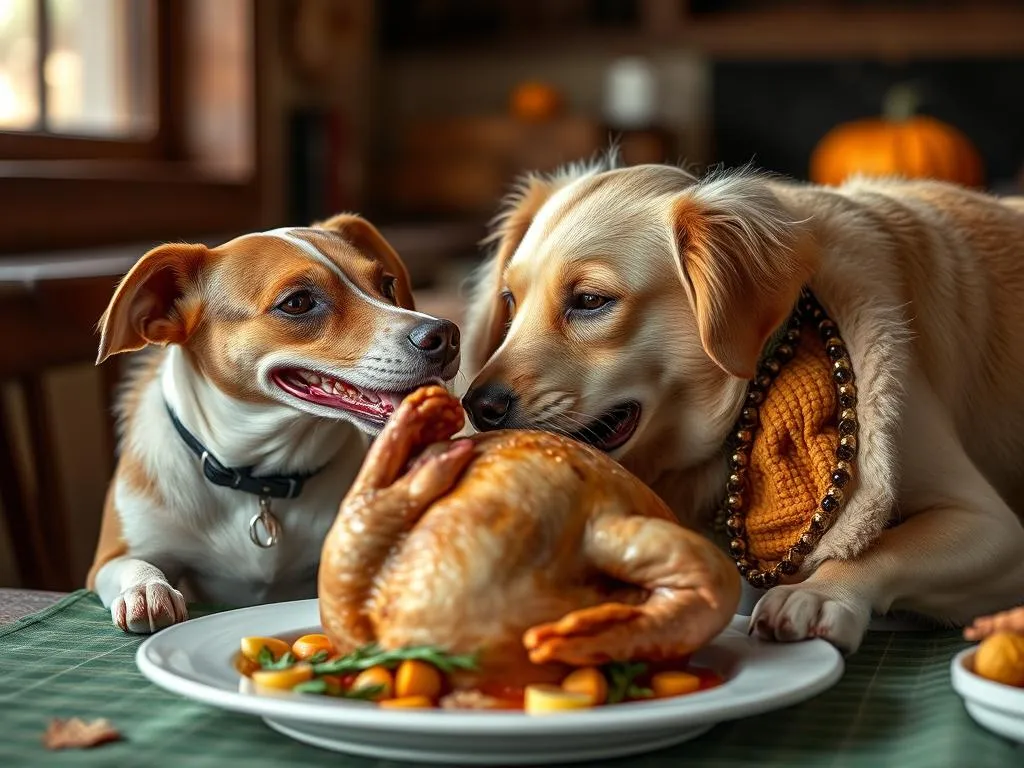
Introduction
As the holiday season approaches, many dog owners find themselves pondering the question: can dogs eat Thanksgiving turkey? This inquiry is not just a casual curiosity; it’s essential for ensuring the health and well-being of our furry companions. Understanding proper dog nutrition is vital, as it directly impacts their overall health, energy levels, and longevity.
During Thanksgiving, turkey often takes center stage at family gatherings, making it tempting to share this traditional dish with our pets. However, it’s crucial to consider both the benefits and potential risks associated with feeding turkey to dogs. In this article, we will explore essential aspects of dog nutrition, the role of turkey as a protein source, safety considerations, and more to provide a comprehensive view of how to include this festive food in your dog’s diet safely.
Understanding Dog Nutrition
Basic Nutritional Needs
Dogs, like humans, require a balanced diet to thrive. At the core of dog nutrition are three macronutrients: proteins, fats, and carbohydrates.
- Proteins are crucial for muscle development and repair, and they play a significant role in the formation of enzymes and hormones.
- Fats provide a concentrated source of energy and support healthy skin and coat.
- Carbohydrates serve as a source of energy and aid in digestive health.
In addition to macronutrients, vitamins and minerals are vital for various bodily functions. For instance, calcium is essential for strong bones, while vitamins A, D, and E play roles in vision, immunity, and skin health. Last but not least, water is the most critical nutrient, as it sustains life and aids in digestion and nutrient absorption.
Common Dog Food Ingredients
Commercial dog food varies widely in quality and ingredients. Understanding what goes into your dog’s food is essential.
- Natural Ingredients: Whole meats, vegetables, and grains are often the best choices.
- Processed Ingredients: Some foods may contain fillers, artificial colors, or preservatives that could be harmful.
Reading labels is crucial. Look for high-quality sources of protein and avoid foods with vague terms like “meat by-products.”
Special Dietary Considerations
Just like humans, dogs have specific dietary needs that can change over their lifetime. Puppies require more protein and calories for growth, while senior dogs may need fewer calories and more fiber.
Health conditions such as allergies, obesity, or diabetes also necessitate special diets. Always consult your veterinarian to tailor a diet that meets your dog’s unique health requirements.
The Role of Protein in Dog Nutrition
Importance of Protein
Protein is a fundamental component of a dog’s diet. It not only helps in muscle development and repair but also provides energy and supports immune function. Dogs require a diet rich in protein to maintain their health, particularly active breeds or those engaged in regular exercise.
Turkey as a Protein Source
When considering protein sources, turkey stands out as an excellent option.
- Nutritional Profile: Turkey is low in fat and high in protein, making it an ideal choice for maintaining a healthy weight while providing essential nutrients.
- Comparison to Other Meats: Compared to chicken, beef, and lamb, turkey is often leaner and can be easier for some dogs to digest. Its unique amino acid profile also supports healthy muscle function and overall vitality.
Can Dogs Eat Thanksgiving Turkey?
Safety Considerations
When it comes to sharing your Thanksgiving turkey with your dog, there are several safety considerations to keep in mind:
- Turkey Skin: While the meat is safe, turkey skin can be high in fat, which may lead to digestive issues or pancreatitis in dogs.
- Seasonings and Additives: Many Thanksgiving recipes include onion, garlic, or other spices that are toxic to dogs. Always ensure the turkey is prepared plain, without seasonings.
- Serving Size and Moderation: Even safe turkey should be given in moderation. Overfeeding can lead to stomach upset or obesity.
How to Prepare Turkey for Dogs
To safely include turkey in your dog’s diet this Thanksgiving, follow these preparation tips:
- Cooking Methods: Boiling or baking turkey without any added fats or seasonings is the best method for preparing it for dogs.
- Remove Harmful Parts: Always remove bones, skin, and any seasoning before serving turkey to your dog. Cooked bones can splinter and cause serious internal injuries.
- Portion Guidelines: A general rule of thumb is to offer no more than 10% of your dog’s daily caloric intake in treats, including turkey. Adjust portion sizes based on your dog’s weight and activity level.
Alternatives to Thanksgiving Turkey
If you want to keep your pup happy without turkey, there are plenty of other safe meats you can offer:
- Chicken: Another lean protein source, easy for dogs to digest.
- Beef: Rich in iron and zinc, but should be served in moderation due to higher fat content.
- Fish: Salmon and sardines are excellent omega-3 sources, but ensure they are boneless and cooked.
Additionally, you can provide dog-friendly Thanksgiving treats like sweet potatoes or green beans, which are safe and nutritious.
Signs of Turkey Allergies or Sensitivities
Common Symptoms
While turkey is generally safe for dogs, some may develop allergies or sensitivities. Common signs include:
- Digestive Issues: Vomiting, diarrhea, or gas can indicate that your dog is reacting poorly to turkey.
- Skin Reactions: Itchiness, rashes, or excessive scratching may suggest an allergy.
- Behavioral Changes: If your dog becomes lethargic or irritable after eating turkey, it might be experiencing discomfort.
What to Do if Your Dog Has a Reaction
If you suspect your dog has had an allergic reaction to turkey:
- Monitor Symptoms: Keep track of any changes in behavior or health.
- Consult a Veterinarian: If symptoms persist or worsen, contact your veterinarian for guidance. They can help determine if a food allergy is present and recommend appropriate treatment.
Creating a Balanced Thanksgiving Meal for Dogs
Incorporating Turkey into a Full Meal
If you decide to serve turkey as part of your dog’s Thanksgiving meal, consider creating a balanced dish. Here’s a simple recipe you can try:
Dog-Friendly Thanksgiving Turkey Bowl
Ingredients:
– 1 cup cooked turkey (shredded, skinless, and boneless)
– 1/2 cup cooked sweet potatoes (mashed)
– 1/2 cup green beans (steamed)
– 1/4 cup plain, unsweetened yogurt (for probiotics)
Instructions:
1. Mix all the ingredients in a bowl.
2. Serve at room temperature.
3. Store leftovers in the refrigerator for up to three days.
Treats and Leftovers: What’s Safe?
When it comes to Thanksgiving leftovers, it’s essential to know what’s safe and what’s not for your furry friend. Here’s a quick list:
Safe Foods
- Sweet Potatoes: Rich in vitamins and fiber.
- Green Beans: Low-calorie and high in fiber.
- Pumpkin: Great for digestion (plain, not spiced).
Foods to Avoid
- Gravy: Often high in fat and may contain toxic ingredients.
- Stuffing: Typically contains onions, garlic, and other harmful ingredients.
- Chocolate: Always toxic to dogs, so keep it far away from your pet.
Expert Opinions and Research
Veterinarian Insights on Feeding Turkey
Veterinarians often emphasize the importance of moderation when it comes to feeding pets human food. Many recommend introducing new foods gradually and monitoring for any adverse reactions. Most agree that plain, cooked turkey can be a healthy treat for dogs when prepared properly.
Common Myths About Dog Nutrition
There are several myths surrounding dog nutrition, particularly during the holidays. One common myth is that all human food is harmful to dogs. While many human foods can be toxic, others can be beneficial when given in moderation and prepared correctly. Always rely on evidence-based practices and consult your veterinarian for advice tailored to your dog’s dietary needs.
Conclusion
In summary, the question of can dogs eat Thanksgiving turkey is one that many dog owners ponder during the holiday season. While turkey can be a wonderful treat, it’s essential to prioritize safety and moderation in your dog’s diet. By understanding your dog’s nutritional needs, preparing turkey correctly, and being mindful of possible allergies or sensitivities, you can ensure a happy and healthy Thanksgiving for your furry friend.
As you gather around the table this Thanksgiving, remember that your dog can join in the celebration with a safe, delicious, and nutritious meal of their own. Always consult with your veterinarian for personalized advice to maintain your dog’s health during the holiday season and beyond.









